Born on this date in 1915, Wilbert "Dutch" Hiller played junior hockey with the Sudbury Wolves in 1933-34 and 1934-35. After playing senior hockey with both the Sudbury Miners and the cleverly named Falconbridge Falcons during the Allan Cup playoffs in 1935-36, he took the most unusual route of playing a season of hockey in England with the Harringay Greyhounds.
It was an important step for him on his way to the NHL, as it was by far the most games he had ever played in a season up to that point with 42, during which he scored 22 goals and 33 assists.
He returned to North America for the 1937-38 season to play primarily with the New York Rovers of the Eastern Hockey League. He played well enough with the Rovers, 26 goals and 56 points in 43 games, that he earned a call up to the New York Rangers to make his NHL debut. In eight games he scored his first NHL point with an assist, and also saw action in one playoff game.
Beginning in 1938-39, Hiller, was a member of the "Roughneck" line playing along side of Phil Watson and Bryan Hextall. The Rangers public relations department wasn't fond of someone named Wilbert being a "Roughneck" and from that point on he became known as "Dutch" Hiller based on the Dutch population of his hometown of Berlin, Ontario, since renamed Kitchener after World War I, despite the fact he was not Dutch at all!
His first full season saw him finish with ten goals and 29 points, which increased to 13 goals and 31 points in 1939-40 as he developed a reputation for being one of the quickest players in the league. During the postseason, the Rangers defeated the Boston Bruins in six games before knocking off the Toronto Maple Leafs in six games, with Hiller assisting on the cup winning goal by Hextall, to capture the Stanley Cup.
The 1940 Stanley Cup Champion New York Rangers
After one more season with the Rangers, Hiller was claimed off of waivers by the Detroit Red Wings for the 1941-42 season. After only seven games, he was traded to the Boston Bruins for the rest of the year.
The same pattern repeated itself the next season as well, as Boston dealt Hiller to the Montreal Canadiens after just three games of the 1942-43 campaign. He found himself back with the Rangers for the 1943-44 season when he was loaned to New York, along with three other players, in exchange for the loan of Watson to the Canadiens.
Back on familiar territory with the Rangers, Hiller set a career high with 40 points from 18 goals and 22 assists in 50 games. Back with Montreal for the 1944-45 season, he had the only 20 goal season of his career on his way to a 36 point season.
While his production dropped in 1945-46, totaling just 18 points, he contributed six points in nine games in the postseason to get his name on the Stanley Cup for the second time in his career as Montreal defeated the Chicago Black Hawks followed by the Bruins.
The Stanley Cup Champion 1945-46 Montreal Canadiens
Hiller was then traded once more, this time to Toronto, who placed Hiller with their AHL club the Pittsburgh Hornets for the 1946-47 season. There he had a good season, scoring 29 points in 64 games and made it to the Calder Cup Finals.
His final season of hockey was spent with the Kitchener Dutchmen playing senior hockey in the Ontario Hockey Association as his eyesight was beginning to fail.
His final NHL totals were 383 games played over nine seasons, 91 goals and 113 assists for 204 points and a pair of Stanley Cup championships.
During 2005, thanks to the NHL lockout, a special program took place where champions of the past were granted a day with the Stanley Cup, a tradition that began long after their playing days had ended. Hiller was one of the lucky men to be granted their day with the cup, some 65 years after having won it for the first time.
From the Hockey Hall of Fame website's "Stanley Cup Journal":
During his NHL career, Dutch Hiller was a member of four clubs — the New York Rangers, Detroit Red Wings, Boston Bruins and the Montreal Canadiens. As a result, he became a de facto member of the exclusive club comprised of Stanley Cup champions, winning with New York in 1939-40 and Montreal in 1945-46. But the club in which Dutch Hiller is most active is the ROMEO Club - Retired Old Men Eating Out. Virtually every morning for the past seven years, a group of approximately 10 gentlemen meet at the local Burger King in La Crescenta, California. There, over coffee, the guys solve the world's troubles and talk about other important topics — like health, women…and hockey.
At 7:15 on the morning of Friday, September 9, the ROMEO Club convened at the Burger King as usual but this time, Dutch brought along a friend — the Stanley Cup!
Sporting a Rangers' ballcap, Dutch had to gulp his coffee between autographs, while his fellow club members pored over scrapbooks Hiller compiled during his career. "I thought people had forgotten me," admitted the 90-year-old champion. "It's unbelievable!" Astonished patrons picking up a coffee and Croissan'wich strained their necks when they realized that the Stanley Cup was in their midst.
At 11 o'clock, as the breakfast crowd had all but evaporated, the Stanley Cup was taken to Dutch's home in nearby Montrose, which borders Glendale to the south and west. There, daughters Pat and Rosemarie hosted as family and friends dropped by to visit Dutch and the Stanley Cup. Hiller regaled his friends and grandchildren with stories about being a goal judge for the Los Angeles Kings during their early years.
"What brought you to L.A., Dutch?" asked a friend. "Well, after we won the Cup with the Canadiens in '46, I got traded to Toronto and played with Pittsburgh (the Leafs' AHL affiliate). Then, I went home for a year (and played with the senior Kitchener Dutchmen in 1947-48). I got a call to coach the Los Angeles Monarchs (of the Pacific Coast Hockey League) in '48-49 and '49-50. We finished in second that last year." Dutch shrugs. "I loved the area and stayed here after that."
Reviewing the scrapbooks and being asked for autographs did Dutch Hiller a world of good. "It's good to be near the Cup again," he admits with a grin.
Hiller passed away just two months after his day with the cup at the age of 90.
Today's featured jersey is a 1943-44 New York Rangers Dutch Hiller jersey. The Rangers used block letters with no serifs or drop shadows from their inception in 1926 through the 1940-41 season. They then changed to the font still in use today with the italicized and serifed letters in 1941-42, adding the now familiar drop shadow the following season, by which time Hiller had moved on.
He did return to the Rangers for the 1943-44 season, during which he wore today's featured jersey style.

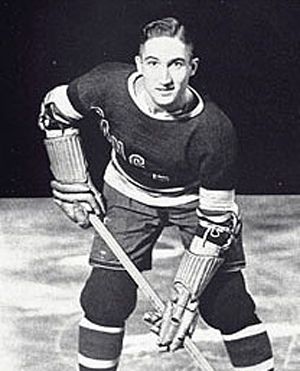
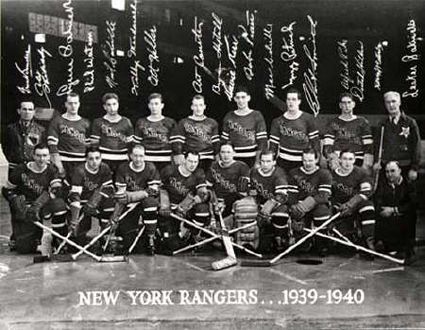
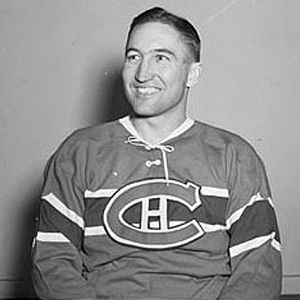
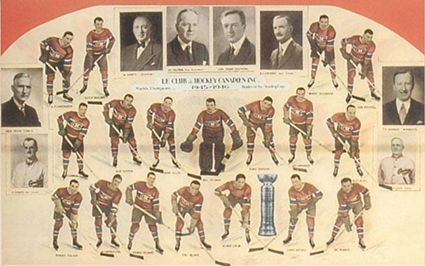
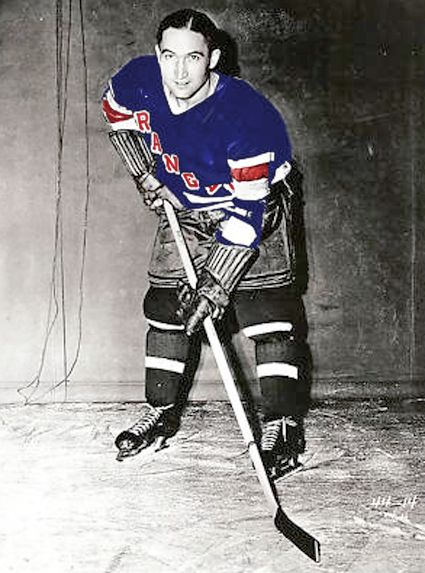










There wouldn't be too many Canadian players who played a season in England before playing in the NHL.
ReplyDelete